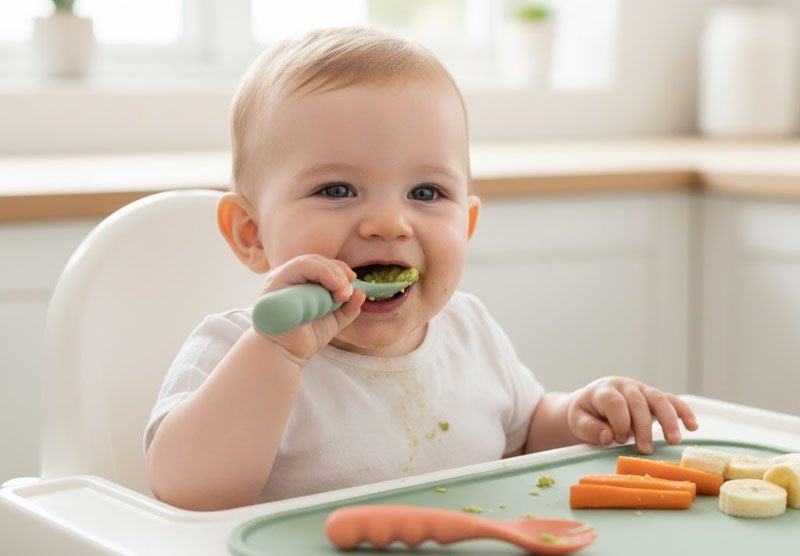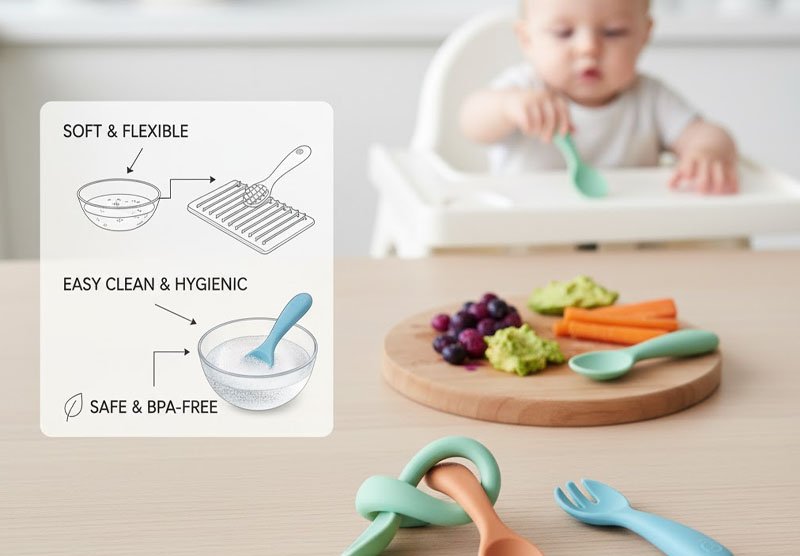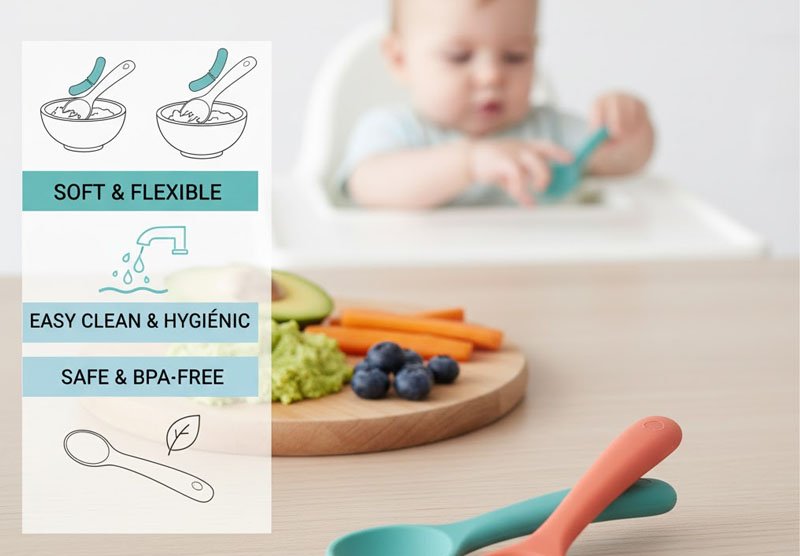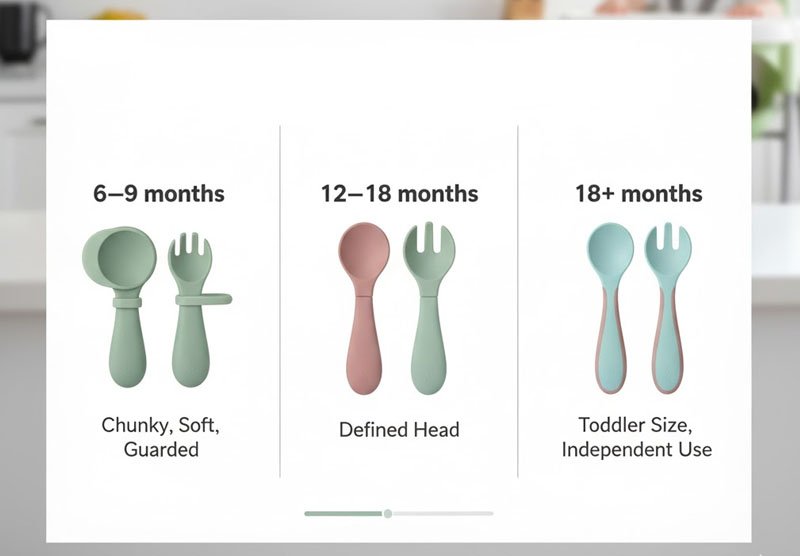Introducing solids is messy. Teaching a baby to feed themselves? Even messier—unless you have the right tools.
The best silicone baby spoons and forks are soft, easy to grip, non-toxic, and designed to support safe, confident self-feeding from the start.

When I started introducing solids to my baby, I quickly realized not all baby utensils are created equal. Some were too slippery, others too hard, and many were just plain unsafe. After trying different types, silicone spoons and forks became my go-to. In this post, I’ll break down what makes a great silicone utensil and how to choose the best ones for your little self-feeder.
Why Choose Silicone for Baby Spoons and Forks?
Babies explore with their mouths, so safety and comfort come first when it comes to feeding tools.
Silicone is soft, flexible, and safe for teething gums. It’s also BPA-free, durable, and dishwasher-safe—perfect for baby-led weaning and early feeding.

Silicone has several advantages that make it the best choice for baby utensils. It’s soft enough for babies who are still teething, but strong enough to scoop food. Unlike plastic, it doesn’t leach chemicals when heated. And unlike metal, it won’t hurt your baby’s sensitive gums.
I especially like how easy silicone is to clean. A quick rinse or run through the dishwasher is enough to get it spotless. Many silicone spoons also come in one seamless piece, which means no hidden corners for food or bacteria to hide.
These benefits make silicone utensils the most hygienic, comfortable, and convenient choice for babies learning to eat on their own.
What Features Make a Baby Spoon or Fork Ideal for Self-Feeding?
Not all utensils help babies feed themselves. Some actually make it harder.
Self-feeding utensils should be short, lightweight, and easy to grip. Soft tips, choke guards, and ergonomic shapes help babies eat safely and independently.

When choosing baby spoons and forks for self-feeding, I always look for three key features:
- Short and thick handles – Babies don’t have fine motor control yet. Short, chunky handles are easier for little hands to hold.
- Choke protection – Some utensils include a built-in guard to keep babies from putting them too far into their mouths.
- Soft, shallow tips – A shallow spoon helps babies scoop more easily, and soft edges protect sensitive gums.
Here’s a comparison of must-have features:
| Feature | Why It Matters |
|---|---|
| Non-slip grip | Easier for babies to hold securely |
| Soft silicone tip | Gentle on gums and safe for teething |
| One-piece design | More hygienic, easier to clean |
| Choke guard | Prevents deep insertion and gagging |
| BPA-free material | Ensures safety during feeding |
These design choices can make a big difference in how confident and safe your baby feels while self-feeding.
How to Introduce Spoons and Forks During Baby-Led Weaning?
Timing and technique matter when it comes to helping babies use utensils.
Start introducing silicone utensils around 6 months. Let babies explore them first, then model usage and offer soft foods they can easily scoop or poke.

I introduced the spoon when my baby started showing interest in grabbing food—around six months. I handed them a spoon at each meal and let them play with it, even if they didn’t eat anything. Babies learn by doing, and exploration is part of the process.
Here’s what worked best for us:
- Start with thick, smooth purées (like mashed avocado or sweet potato)
- Load the spoon for them and hand it over
- Eat together so they can copy your movements
- Praise them for trying—even if the spoon ends up on the floor
For forks, I waited a bit longer—around 10 months—once my baby could poke food and bring it to their mouth. I started with soft foods like banana chunks or steamed carrot sticks.
Patience is key. Every baby moves at their own pace.
What Are the Best Shapes and Sizes for Different Ages?
As your baby grows, their motor skills improve—and their utensil needs change.
Babies under 12 months need shorter, thicker utensils. Toddlers can use longer spoons and forks with more defined heads for better control.

Different stages need different tools. Here’s what I’ve found works best by age:
| Age Range | Spoon & Fork Type |
|---|---|
| 6–9 months | Chunky handles, soft tips, built-in choke guard |
| 9–12 months | Slightly longer handles, still soft, shallow bowl design |
| 12–18 months | Defined fork tines, deeper spoon bowl, firmer handle |
| 18+ months | More grown-up style, but still with safe, soft materials |
You don’t need to upgrade every few months, but having the right size and shape helps build confidence. A spoon that’s too long or slippery can frustrate a baby. A well-designed utensil encourages independence.
At RuiYang, we offer custom-designed utensils by age group, with subtle differences in design that match developmental stages. This kind of tailoring matters, especially for parents focused on skill-building.
How Do You Clean and Store Silicone Baby Utensils?
Clean feeding tools help avoid bacteria and keep your baby safe.
Silicone utensils are dishwasher-safe and quick to sanitize. Store them in a covered container or utensil cup to keep them clean between uses.
Cleaning baby utensils is a daily task, so I look for tools that make it easy. Silicone spoons and forks can go straight in the dishwasher, which saves time. I usually rinse them right after use, then put them in the top rack of the dishwasher with the bottles.
For travel, I keep a few extra clean utensils in a zip pouch in the diaper bag. At home, I use a covered utensil caddy just for baby tools. This keeps them separate from adult forks and spoons and avoids cross-contamination.
Silicone also doesn’t absorb colors or odors, which is a big plus when you’re feeding babies colorful foods like berries, pumpkin, or curry.
What Are the Best Brands and Sets to Buy?
There are many baby utensils out there—but only a few that really work well.
Look for trusted brands like Mushie, ezpz, NumNum, or RuiYang that use 100% food-grade silicone and design utensils for real-life baby hands.
Over the years, I’ve tested a dozen different sets. Some broke after a few weeks. Others just didn’t work for my baby. The best ones had great grip, soft tips, and were actually easy for babies to use.
Here are a few top picks:
| Brand | Strengths |
|---|---|
| Mushie | Minimalist design, soft and safe materials |
| ezpz | Built-in choke guard, perfect for beginners |
| NumNum | Innovative pre-spoon with texture for thick foods |
| RuiYang | Customizable, eco-friendly, ideal for bulk or private label |
If you’re developing a baby product line or sourcing for your brand, RuiYang offers full OEM/ODM support. You can tailor colors, shapes, and packaging to meet your market needs while maintaining high safety standards.
Conclusion
Silicone baby spoons and forks make self-feeding safer, easier, and more fun—helping babies build confidence at every bite.